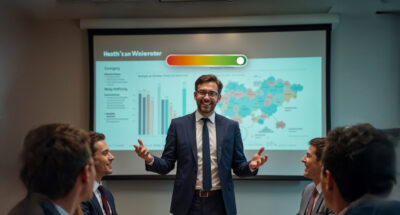
Five must-reads to chill and refresh you on your summer vacation
From nightmare predictions of a dystopian future to the best ways to get a good night’s sleep, our selection has something for everyone. ...

by Alyson Meister, Amin Kaboli, Katherine J Armstrong Published December 19, 2024 in Wellness • 8 min read
Even as you are looking ahead to the holiday season and spending time with loved ones, the pressure at work often intensifies. Deadlines might suddenly proliferate; projects must be completed and there’s typically a big push towards end-of-year results or securing new business for the year ahead.
The holiday season itself is not without its unique stressors and exigencies. If you are hosting family and friends, the pressure will be on you to prepare meals and accommodation, find gifts, organize entertainment, and spend extended time with other people – all of which can be joyful and demanding in equal measure.
And returning to work, of course, has its challenges. As the demands of work start to ramp up, it can be hard to navigate the dip in energy and motivation that all too often accompany January’s shorter, darker days if you are in the Northern Hemisphere; the distractions of the summer if you are south of the Equator.
So, what can you do to fortify your well-being in the run-up to, during, and in the wake of the holiday period?
Be realistic about the holiday season and recognize that perfection is an impossible goal.
Holidays are meant to be a time of replenishment: a chance to recharge batteries and recover from the stress and tensions that accompany work. But the process of recovery is not straightforward. Ironically, it’s when we feel most stressed and depleted of energy that we struggle the most to recover. Science shows that these are the times when we take fewer breaks, work longer hours, eat less healthily, and take less care of our bodies and minds. Organizational culture can also exacerbate this paradox if there is an assumption or demand that you push on through to meet that deadline, say, or finish that complex report before the end of the year.
One way to break this cycle is to be purposeful about setting boundaries, making time for recovery to happen, and identifying those activities or experiences that re-energize you, before, during, and after the holidays.
Boundary setting begins with detachment. In the run-up to the end of the year, it’s important to learn how to start disconnecting and switching off from the demands of work. This might mean compartmentalizing a little, setting aside space to finish pressing projects and meet deadlines while consciously making time for things that aid recovery – be that exercise, cooking, reading, video games, or whatever helps you shut down thoughts about work. Something that can help you detach purposefully and set those boundaries between work and personal life is mindfulness. Identify those triggers that prevent you from being mindful. Let’s say having your phone or your laptop nearby is a prompt to check emails or messages from work during these breaks, try simply turning them off or deactivating alerts. Better still, put them in a drawer out of sight and be purposeful about rewarding yourself time to be still and at peace and dedicated to something that doesn’t cause you cognitive stress.
Boundary setting is key during the holidays too. Time with loved ones can be restorative but can also stir certain emotions or heighten tension, especially if there are (impossible) expectations attached to joyfulness and celebration. Be purposeful here too. Recognize the topics or the relationships that can trigger stress, set emotional boundaries that protect your emotional well-being, and plan times to step away. Even if it’s just going for a walk or being in your own space for a few minutes, carving out time for recovery activities that promote well-being is critical. So too is managing expectations.
Be realistic about the holiday season and recognize that perfection is an impossible goal. This is critical too, as you gear up to re-entering work post-vacation. Try, if you can, to be gradual as you re-enter the workplace; plan some reset or downtime in the first couple of days as you slowly get back into things. This can be difficult if the new year comes rushing heralded by high-octane intentions: resolutions to achieve more, be better, exceed goals, and whatever other expectations you and your organization might want to impose.
Again, be realistic. All too often, January is characterized by a post-vacation dip in energy, motivation, and enthusiasm. Acknowledge that dip and plan for it by giving yourself recovery activities and experiences that re-energize you both outside and inside of work. This can be as simple as instituting micro-breaks: a few minutes of mindfulness or meditation, eating something tasty and nutritious, chatting to a supportive colleague or reading something non-work-related – things that help you recover and protect your cognitive, emotional, and physical well-being. Try to resist the urge to hold off recovery time for evenings or weekends, or even that next elusive holiday, which may be weeks or months further down the line. Create hope and sustain your well-being by planning things, however small, that you actively look forward to and enjoy on a daily basis.
Try reframing the way that you think about these responsibilities.
Holiday get-togethers can feel like impositions.
Whether you’re preparing your home or meals or having to manage Uncle Jerry or Cousin Louise, it can feel like a burden or time that is somehow being taken from you. Try reframing the way that you think about these responsibilities. Instead of seeing time spent with your sister or in-laws as something to be endured, say, why not reframe it like this: my sister might annoy me, but I have a sister. If you have to dedicate some time to work even as you are preparing or celebrating, try not to let resentment overcome you. Reframe it like this: won’t this effort today put me in a great position when January comes around? If you have to cook a three-course meal for 12 people, instead of focusing on the burden, allow yourself to feel fortunate to have so many loved ones close to you in your life.
Purposefully reframing from negative to positive is good for your well-being. For one, it gives you greater awareness and therefore control and ownership of your emotions. But the benefits of positive thinking go further. Research suggests that positivity can reduce stress and inflammation, protecting our physical and emotional well-being, while simultaneously opening us up far more to curiosity and learning. Even the simple act of smiling activates different brain chemicals and neurons that send messages of positivity and resilience back at us, boosting our overall well-being.
Aim to keep this kind of reframing and positive thinking front and center through the vacations and on into the new year. If you are setting resolutions for yourself personally or professionally, try to think of them as intentions rather than hard-set goals that can set you up for failure and stress. And remember, the future doesn’t start on January 01. In reality, we are always in flow from yesterday to today to tomorrow. Whatever intentions you have for the new year, you will know more about the year to come in February or March than you possibly can on December 31. Reframing resolutions from something rigid to something pliable – intentions that you adapt and modify on an ongoing basis – is a better way to embrace the fluidity of life, and to nurture and protect your well-being.
A better approach might be to reframe resolutions: from rigid goalposts that demarcate success and failure to beacons that illuminate our aspirations and shine them back at us.
The tradition of setting New Year’s resolutions following the holiday period can be helpful as a way of galvanizing ourselves toward new goals and achievements. But if we see resolutions as a to-do list – something that we might struggle to maintain and a measure by which we end up (unfavorably) judging ourselves— those good intentions can very quickly become demoralizing and dispiriting.
A better approach might be to reframe resolutions: from rigid goalposts that demarcate success and failure to beacons that illuminate our aspirations and shine them back at us. This way we can create a vision for the future that drives positive forward momentum and enables us to flow over the obstacles and disruptions to progress. Seeing resolutions and intentions this way also helps us to release any feelings of guilt or inadequacy when achievements fail to materialize the way we want or deadlines pass. We can see them more as a form of continuous discovery: a source of learning and personal growth.
The Persian poet Mewlana Jalaluddin Rumi is perhaps best known for a work called The Guest House, which invites us to think of ourselves as houses or spaces into which emotions flow like transient and unexpected guests. This is a helpful way to think about the negativity that can surround missed deadlines, unrealized goals, and all the other pitfalls that can tie to our best intentions. Even if negative emotions are a “crowd of sorrows who violently sweep your house empty of your furniture, still treat each guest honorably,” writes Rumi: “He may be clearing you out for some new delight.”
So, as you ponder the year ahead of you this holiday season, ask yourself some questions – and remember to be kind to yourself in your answers:
Adapted from https://www.imd.org/ibyimd/coaching-corner/jo-and-how-to-make-resolutions-for-the-future/

Professor of Leadership and Organizational Behavior at IMD
Alyson Meister is Professor of Leadership and Organizational Behavior and Director of the Future Leaders program and the Resilient Leadership Sprint, she is also co-director of the Change Management Program at IMD Business School. Specializing in the development of globally oriented, adaptive, and inclusive organizations, she has worked with executives, teams, and organizations from professional services to industrial goods and technology. She also serves as co-chair of One Mind at Work’s Scientific Advisory Committee, with a focus on advancing mental health in the workplace. Follow her on Twitter: @alymeister.

Lecturer at the Institute of Mechanical Engineering at EPFL
Amin Kaboli is a lecturer at the Institute of Mechanical Engineering at EPFL and has a particular interest in people, process, and technology. He teaches several courses on “change and transformation” to business executives, managers, and graduate students.

Consultant and executive coach
Katherine Armstrong is a consultant and executive coach with more than 25 years of multi-disciplinary experience in corporate culture, communications, human resources, strategy deployment and change management. She holds an MBA from London Business School and graduated magna cum laude from Duke University. Katherine has also edited over 20 leadership and strategy books and is the co-author of the reference guide Perfect Phrases for Writing Employee Surveys (McGraw-Hill, 2010).

July 4, 2025 in Wellness
From nightmare predictions of a dystopian future to the best ways to get a good night’s sleep, our selection has something for everyone. ...

June 23, 2025 • by Rachel Lewis in Wellness
Dr. Rachel Lewis explores how empowering teams to co-create solutions can reduce workplace stress and boost wellbeing...

June 4, 2025 • by Nele Dael in Wellness
With executives experiencing unprecedented levels of leadership burnout, here are three ways for organizations to help employees prioritize their recovery...

March 4, 2025 • by Ginka Toegel in Wellness
Current and aspiring women leaders may be self-conscious about their appearance, but strategies for developing an authentic professional style can redirect attention to their achievements, as they dress for comfort and confidence....
Explore first person business intelligence from top minds curated for a global executive audience